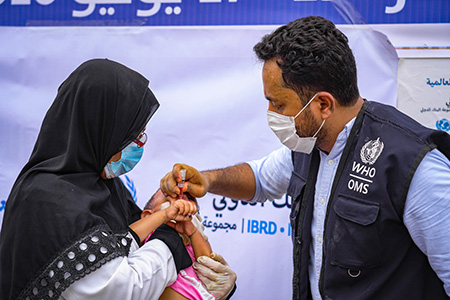 31 August 2023—The World Health Organization (WHO) is concerned over increasing cases of measles and rubella among children in Yemen. As of 31 July this year, the number of suspected cases of measles and rubella in Yemen has reached almost 34,300 cases and 413 deaths, compared to 27,000 cases and 220 associated deaths in 2022. There is also limited information on the outbreak’s impact on pregnant women who remain at high risk.
31 August 2023—The World Health Organization (WHO) is concerned over increasing cases of measles and rubella among children in Yemen. As of 31 July this year, the number of suspected cases of measles and rubella in Yemen has reached almost 34,300 cases and 413 deaths, compared to 27,000 cases and 220 associated deaths in 2022. There is also limited information on the outbreak’s impact on pregnant women who remain at high risk.
“Ideally, the outbreak response vaccination campaign should target at least all children under the age of ten to be comprehensive and effective; however, the current funding gap has eroded support and limited the target to children under five years of age—the group with higher mortality rates,” said Dr Arturo Pesigan, WHO Representative in Yemen.
The increase in measles and rubella cases among children in Yemen this year is occurring within a context of economic decline and low incomes, displacement, and overcrowded living conditions in camps, coupled with an overwhelmed health system, low immunization rates, and a large number of children who remain unreachable through routine immunization interventions. According to the WHO-UNICEF National Immunization Coverage Estimate for 2022, 27 percent of children under one year of age in Yemen are unvaccinated for measles and rubella and have not met the minimal set of vaccines for full protection.
WHO is working with the Yemeni Ministry of Public Health and Population (MoPHP) and partners to increase support for routine vaccination interventions. WHO also continues to work within the National Health Framework to provide technical and financial support to improve coverage among children. In 2022, WHO supported the protection of around 913,000 children from measles and rubella. As of July 2023, MoPHP with the support of WHO and other partners reached a coverage rate of around 65 percent of all children—both doses of measles and rubella (MR1 and MR2). A measles-rubella vaccination campaign, targeting 1.2 million children under the age of five, is planned to be implemented in September this year.
For more information visit: Yemen Health Emergency
Media contacts: WHO Yemen Communications,
Note to editors
About the Expanded Programme on Immunization (EPI) in Yemen: Yemen’s Expanded Programme on Immunization started in 1974 and aims to reduce the incidence rates of maternal and neonatal tetanus, ensure full immunization of children under one year of age, and extend all new vaccines and preventative health interventions to children in all districts, reducing the number of deaths associated with vaccine-preventable diseases.
Various childhood disease vaccines have been introduced since then, and currently, immunization against diphtheria, pertussis, tetanus, poliomyelitis, measles, pneumococcal, hepatitis B, diarrhea, pneumonia, and tuberculosis is available to every child to be protected against vaccine-preventable diseases. Similarly, a surveillance system was established to report, investigate, and respond to any outbreak related to vaccine-preventable diseases in Yemen’s Expanded Programme on Immunization.
About WHO: Since 1948, The World Health Organization (WHO) has been the United Nations agency dedicated to advancing health for all, so that everyone, everywhere can attain the highest level of health. WHO leads global efforts to expand universal health coverage, direct and coordinate the world’s responses to health emergencies and connect nations, partners and people to promote health, keep the world safe and serve the vulnerable.








